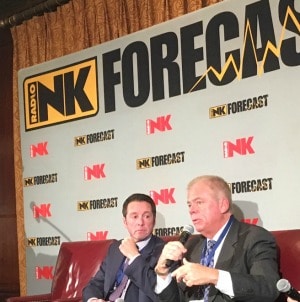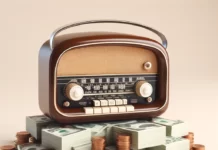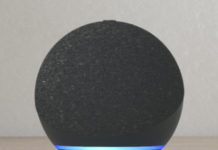
That’s the view from Galaxy Communications CEO Ed Levine who was part of Radio Ink’s “Independent Operator” panel at Forecast 2017. Levine’s point: If Facebook and Google can own 100% of the digital space in his market, why can’t he own 100% of the radio stations in his market? Those companies, and other digital companies, are coming after the local advertising dollars and Levine says it is not a fair fight because he’s regulated by the government and they are not. We asked Levine to expand his thoughts on his theory. Here’s what he had to say.
“The current radio ownership rules were written in the pre-Facebook, pre-Google, pre-digital, prehistoric media era. We all agree that those two companies in particular, and the digital space in general, is where the listeners and advertiser dollars are going and will continue to migrate to. There are virtually no federal regulations in place to stop those companies and others from expanding, and they continue to acquire other important assets in that space and perhaps that is as it should be. However, you can’t have one set of rules for them in Syracuse and Utica to compete for advertising dollars and a completely different set of rules for Galaxy and other local companies.
“In many cases we are directly competing with Google, Facebook, Snapchat, Pandora, etc. for LOCAL advertising dollars. This is no longer theory, it’s happening in every local market in America. That’s capitalism at work. However, it seems to me that in order to make it a more even playing field, the local radio broadcaster should be able to deliver the ENTIRE radio market and not just the federally mandated portion that the law says I can own. There are no such laws prohibiting the digital players in these markets and that’s where many of our advertisers are going since the digital companies can deliver virtually the entire market. The radio broadcaster can only deliver the slice of that audience that the FCC allows. Lets make it a fair fight.
“In 2007, I acquired the Clear Channel (as it was called then) stations in Utica-Rome. Clear Channel did not want to be in that market and we already had a decent presence there. So we bought four of their stations and sold the two that we couldn’t own, due to FCC restrictions, to another local broadcaster. Fast forward 10 years and all of those stations are doing much better in every metric, including job creation and community involvement, than under the previous huge group owner.
“Simply put, we wanted to be in that market and they didn’t. We were committed and they weren’t. Perhaps we have all gotten consolidation wrong. It may be more beneficial for all parties to have one or two companies owning all the stations in a given market rather than companies owning a handful of stations in hundreds of markets. It better serves the listeners and the advertisers, and allows the FCC-regulated radio broadcaster to compete on a level playing field with digital competitors in a given market.
“These guys are competing for our local ad dollars. Lets make it a fair fight and allow the radio broadcaster to get the mass in a given local market to compete effectively.”
Ed Levine can be reached at [email protected].
Save the date. Forecast 2018 is being held on November 15, 2017 in New York City.









Spoken like a true disconnected capitalist. If you don’t have the creativity or marketing strategy to compete, maybe you should get out of the business. People want variety, diversity and quality driven by good old fashioned competition. Monopolies don’t go anyone any good.
Pretty amazing: “If Facebook and Google can own 100% of the digital space in his market…” proves only how little Ed Levine knows about the digital market.
“The current radio ownership rules were written in the pre-Facebook, pre-Google, pre-digital, prehistoric media era.” – Hope this logic goes through, because then we can use it to re-evaluate outdated 2nd Amendment rights, what with words on “bearing arms” and a “militia” being from such a long time ago too.
“However, you can’t have one set of rules for them … and a completely different set of rules for Galaxy and other local companies.” – So, Mr. Levine agrees then that broadcasters should be paying a performance royalty fee for music played online?
This whining is what happens when panic sets in.
Because you would have a monopoly of radio signals in your market, you idiot! What a concept. Fewer bigger companies running everything, as American as Thanksgiving.
Yeah! What Todd said. 🙂
That the airwaves are owned by the public, however and practically, is no more than a romantic, distant memory.
What a terrible comparison! Radio is not the same as internet and the web is not a monopoly. The digital companies mentioned are successful because they have developed superior products that have mass appeal. Radio is lagging in that realm. Additionally, they don’t “own” 100% of the market. In the comparison, the speaker mentions multiple entities which compete with each other in his market and every other market in the country/planet. And there’s plenty more which aren’t marquee brands (yet). You have to fight your slice and you do so with programming products–not politics.
Most of radio hasn’t developed their digital platforms to the extent as those mentioned in the article and those radio companies who have developed entry level platforms came late to the party. And what they provide now, i.e. iHeartMedia app, is hardly “local.” The whole point of the app is to expose listeners to other properties or allow locals to take their shows/stations with them wherever they go–how many listeners really do that? I’m sure some but their most popular shows are already “syndicated” in multiple markets.
Shortly after I launched my internet radio station I had a business owner ask me how my rates compared to the local terrestrial station. Being a startup, we were/are “very competitive.” But the point demonstrates how advertisers of all sizes should have options in the market when it comes to radio (web or terrestrial). Allowing one broadcast company to set the rates and parameters for every available option would leave many advertisers on the sidelines. And, if you own everything, where’s the incentive to create and conquer your competitors in the market with quality programming ? Honestly, as we’ve seen over the last decade plus, it’ll devolve into “good enough” programming.
The airwaves belong to the public and shouldn’t be monopolized–nationally and locally.
How, I wonder, does one smaller company or, for that matter, a large conglomerate having an absolute monopoly in a local market do anything for an advertiser or a set of audiences?
Radio not being able to successfully compete against digital outfits is about radio not being able to compete against digital outfits. The potential is there.
If the wishes of Mr. Levine (and perhaps others) were granted by the feds, the motivation to deliver quality services to their markets would drop off the table.
After all, the bulk of the local advertising that has gone to digital is also as shoddy as that which is produced by local radio. Many advertisers are cross-platforming second-rate radio spots as the content for their online efforts.
Has radio responded with better spots? Has radio responded with better programming? Has radio responded with better education for local advertisers? Has radio responded with better training – for all departments?
Local monopolies would serve only the operators – and maybe only for a short time.